Recent Water Damage Posts
Preparing Your Home for Winter
11/29/2022 (Permalink)
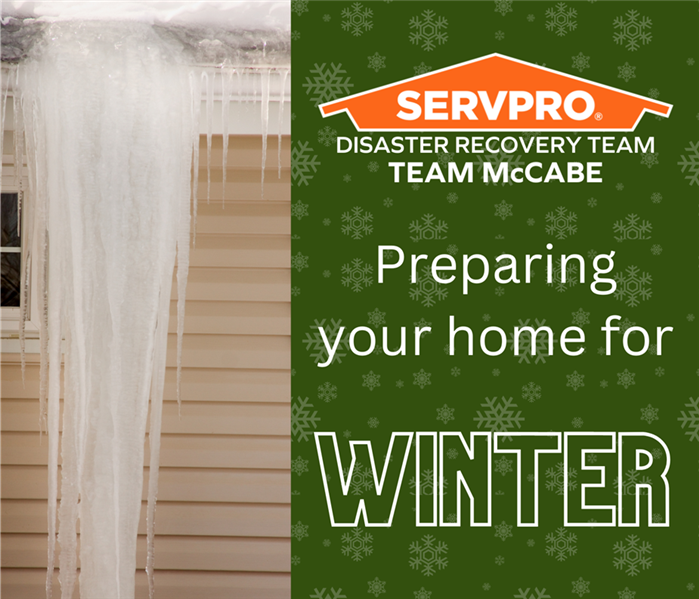 In the event of any winter damage to your home this winter, do not hesitate to give us a call, we are here to help.
In the event of any winter damage to your home this winter, do not hesitate to give us a call, we are here to help.
Whether this is your first winter in your new home or your fifteenth, there are some measures you should take to prepare your house for the next few months. While your personal plan may be to turn on the heat and hibernate through the winter, the snow, ice, and rain can still cause your home some serious issues inside and out.
The outside of the house is the number one hassle we think of in the winter, there is shoveling, plowing, and clearing off the cars. Unfortunately, snow can accumulate and cause a lot of direct damage to the house. Snow buildup can cause strain on the roof and should be removed as soon as it is safe. Ice can also accumulate on your gutters causing ice dams that are not only dangerous to your home but can also cause injury if it falls or is removed unsafely. Your gutters should be cleaned by removing leaves and other debris before the first storm of the season and if you do see ice building up you can clear them using a de-icing agent or a heated gutter cable to remove them without causing injury. Frequent temperature changes can also put cracks in your chimney which should be monitored throughout the winter so that repairs can be made as soon as the weather improves. Another outdoor situation to monitor is the surrounding trees; as snow and ice gather no tree limbs they can become weighed down and snap causing damage to the home or other surrounding structures. Trees should be pruned in the fall and cleared as needed during the winter to prevent any potential damage.
The cold can cause cracks in the caulk within the house causing drafts and affecting your heating bill. The wet conditions can also cause rotting along your door frames. This can lead to termites in the spring and even extensive damage that might result in you needing a new door frame. Be sure to check for any wood rot along the bottom of the door frame and fill in any damage with epoxy wood filler as needed. Frozen pipes are arguably the most prevalent issue with a few things that can be done to help prevent them. More specific prevention ideas for frozen pipes are written about in a recent blog.
The basement can also be a problem area and not just with your sump pump, though that is definitely a common element in basement focused water losses. When the heavy snow begins to melt it can seep into the basement or even cause the foundation to crack. With any signs of water in the basement be sure to check if your sump pump is working properly, and that the extension hose is draining. If the temps are below freezing remove the extension hose before a freeze causes a backup into your home. Ensure you have the proper yard drainage and repair any foundation cracks as needed throughout the winter.
These are just a few areas to keep an eye on as the temperatures drop and we close out the year. Hopefully, these tips will help prevent some water losses however they may not be completely foolproof. If you do notice any damage to your property this winter do not hesitate to give us a call, we are here to help.
Frozen Pipe Prevention
11/2/2022 (Permalink)
Frozen pipes are something that every homeowner worries about as the winter season approaches. Each year SERVPRO Team McCabe provides water damage restoration services to many homeowners who experience this issue. There are several steps that can be taken to help prevent pipes from freezing and bursting in your home.
Many people try to lower their heating bill while on vacation by turning the heat off while they are away. If you will be going away during cold weather, leave the heat on in your home, and set it to a temperature no lower than 55° F. Your heating bill will still be lower than average, but it will also save you major cleanup costs after a pipe bursts in your home.
With the heat above 55 you can also keep the open kitchen and bathroom cabinet doors to allow warmer air to circulate around the plumbing. The heat from your home will make it nearly impossible for them to freeze. This doesn't mean you have to keep your cabinets open all winter, you can do so if you're on vacation, or even a few hours a day while home can help.
You may also want to Consider installing specific products made to insulate water pipes like a pipe sleeve or installing UL-listed heat tape on exposed water pipes you can get from a local hardware store. Even a small amount of newspaper can provide significant protection in areas that drop below freezing for a short period of time. It is also important to make sure that hose bibbs are turned off from the inside and opened on the outside to prevent damage to pipes.
When the weather is very cold outside, you can let the cold water drip from the faucet connected to the exposed pipes. Running water through the pipe even at a trickle helps prevent pipes from freezing. The constant movement of water prevents the pipes from freezing. This is something that should be done especially if you are out of your home for a few days and expect the weather to drop below freezing.
Keeping some of these tricks in mind can help prevent a major mess in your home during the winter season. Unfortunately, following these tactics does not guarantee you will not have an issue with your pipes. When disaster strikes, call SERVPRO Team McCabe.
Why Build Containment?
5/26/2022 (Permalink)
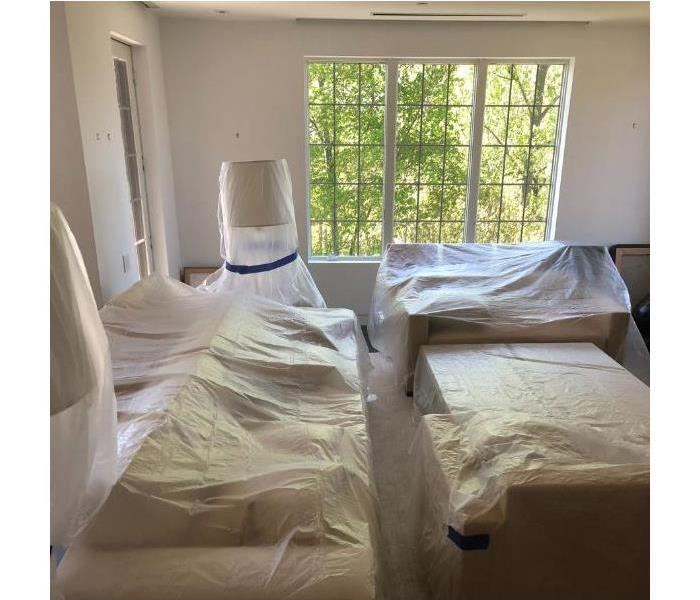 SERVPRO Team McCabe understands how important it is to return your home or business to preloss condition as quickly and smoothly as we are able to.
SERVPRO Team McCabe understands how important it is to return your home or business to preloss condition as quickly and smoothly as we are able to.
Containment is generally used to prevent the occurrence of additional damage to contents in the home that have been unaffected or only lightly affected. Once our crew arrives on site we scope the job and then begin work to either place containment or completely remove any content on the job site. Most content is packed out and moved off of the job site if it was heavily affected and needs cleaning. Our dedicated Content Crew will lead this process and advise on what can stay onsite and be contained. Containment plastic can be used to wrap specific items or to section off an area of the house by sealing off the doorways and vents. Another great use for containment plastic is to help create negative pressure by sectioning off an area and placing equipment inside the containment to aid in drying.
SERVPRO Team McCabe understands how important it is to return your home or business to preloss condition as quickly and smoothly as we are able to. An important part of this is to prevent any secondary damage to your contents that can be caused by a continuing leak, microbial growth, or even dust and debris caused by the remediation efforts.
Washing Machine Safety
1/25/2022 (Permalink)
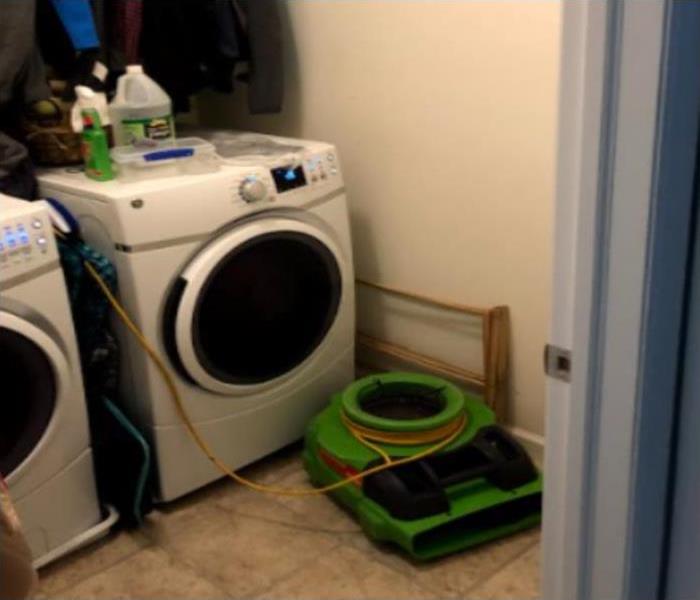 Be sure to stay up to date with replacing your washing machine hoses. If there is a leak SERVPRO is here to help.
Be sure to stay up to date with replacing your washing machine hoses. If there is a leak SERVPRO is here to help.
Millions of Americans depend on washing machines for quick, easy, and thorough cleaning, as opposed to some older methods that do not do nearly as good a job.
As a matter of fact, researchers estimate that the average family of four does about 8 to 10 loads of laundry every week! If you're wondering what the quick math correlates to over the course of the year it's over 500 loads of laundry!
With a demand like that, it is imperative that you take the necessary steps and precautions to make sure it runs properly and without error.
There is a lot of wear and tear that comes with this type of usage, so we wanted to run through some maintenance tips to make sure your machine remains in tip-top shape and in great working order.
- First and foremost, you are going to want to replace your washing machine lines at least every 3-5 years; each time the machine is turned on or off, the lines contract which could eventually lead to bursts.
- It is highly recommended that you switch from rubber hoses to stainless steel braided hoses.
- Before you replace these hoses, make sure your water is turned OFF!
- Finally, check your hoses for leaks at least once a year!
We hope you learned how to take better care of your washing machine, and remember: for all of your restoration needs, call SERVPRO!
Routine Appliance Checks
1/21/2022 (Permalink)
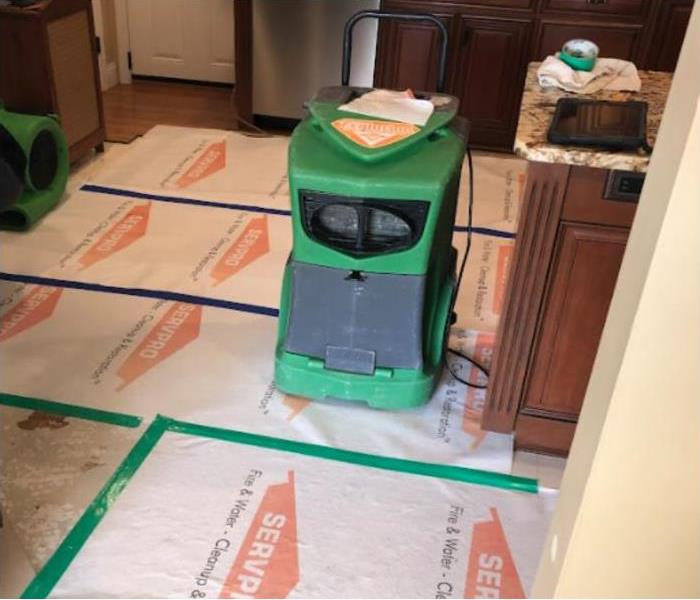 Appliances should be checked regularly to avoid any hidden water damage. If any damage occurs call SERVPRO we are here to help.
Appliances should be checked regularly to avoid any hidden water damage. If any damage occurs call SERVPRO we are here to help.
Typically water damage in a home or other property are due to common things like floods or burst pipes however, there are other causes that can sometimes go unseen. The most common cause of hidden water damage is household appliances which can pose a threat to your home of business when left unattended
Refrigerators, washing machines, dishwashers, air conditioners, and hot water heaters are the biggest culprits that are typically to blame for costly water damage repairs.
Refrigerators and dishwashers can definitely cause damage in your kitchen and should be regularly pulled away from the wall to check your flooring for any leaking water. While pulled out you should also check the water lines and try to keep them from tangling which can increase your chances of an issue once the appliance is back in place. Dishwashers are sometimes not covered in your insurance policy so be sure to check up on your dishwasher regularly because it could be the source of a huge headache for you.
Washing Machines use a lot of water and are also used often so they can also be a common cause of water damage. Washing Machines need the same care as your other appliances so just be sure to pull them out regularly and check your floors and hoses for any water leakage. These hoses have a lifespan of about 5 years and should be replaced on a schedule to avoid any unnecessary damage.
Air conditioners do have implementations that remove moisture as the machine runs, but any issues with these designs could allow water damage to occur. Make sure to follow all of the company's guidelines and to check regularly for leaks.
Hot water heaters are something we sometimes forget about because they are often tucked away out of sight and they end up out of mind. They do have a life of about 8-12 years and are usually forgotten about until it’s time to get a new one or until the old one blows. Try to keep an eye on your hot water heater regularly checking on the external components, making sure the seals and pipes aren’t leaking anywhere. Because your hot water heater is typically hidden away it has the potential to cause a good amount of damage before being remediated especially if it’s in a place like a closet or basement where it can affect a lot of other content in your home or business.
Please be sure to follow these routine checks so there are no surprises in your home but if you need us we are here to help! For all of your water restoration needs, call SERVPRO!
Water Damage Tips
1/21/2022 (Permalink)
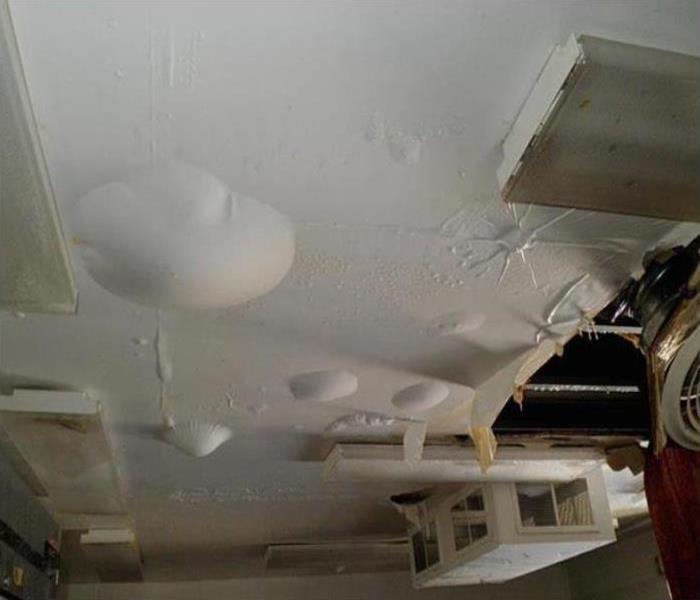 Follow these tips if you experience any water damage while you wait for help to arrive.
Follow these tips if you experience any water damage while you wait for help to arrive.
What you can do until help arrives
After any water damage situation, your primary focus should be safety:
- Is it safe to stay in the house?
- Electrical and "slip and fall" hazards are some of the most prevalent concerns.
- Only do activities that are safe for you to perform.
- Wet materials can be VERY heavy. Be careful!
What To Do After Flooding
- Remove excess water by mopping and blotting.
- Wipe excess water from wood furniture after removal of lamps and tabletop items.
- Remove and prop wet upholstery and cushions.
- Place aluminum foil or wood blocks between furniture legs and wet carpeting.
- Turn air conditioning on for maximum drying in summer.
- Remove colored rugs from wet carpeting.
- Remove art objects to a safe, dry place.
- Gather loose items from floors.
What NOT To Do After Flooding
- Don't leave wet fabrics in place. Hang furs and leather goods.
- Don't leave books, magazines or other colored items on wet carpet or floors.
- Don't use your household vacuum to remove water.
- Don't use television or other household appliances.
- Don't turn on ceiling fixtures if ceiling is wet, and keep out of rooms where ceilings are sagging.
Flooded Basement Cleanup and Restoration
12/23/2021 (Permalink)
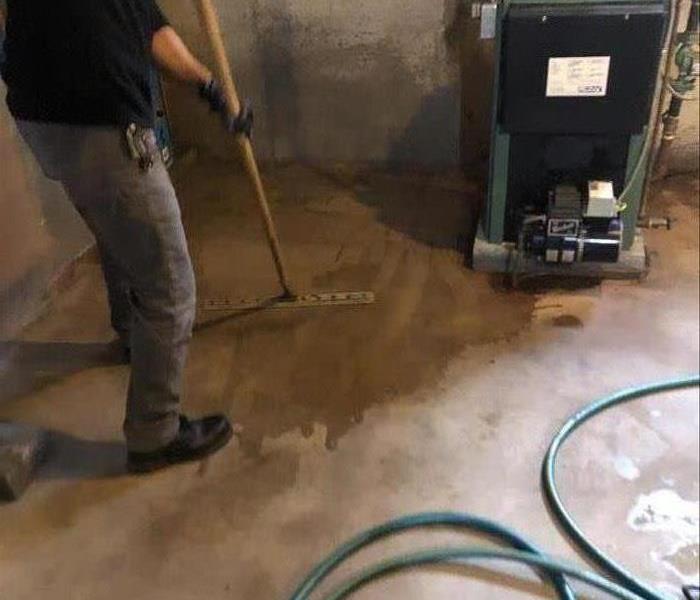 Basement flooded? Call SERVPRO we are here to help.
Basement flooded? Call SERVPRO we are here to help.
There have been too many homeowners that have descended down their basement steps to find a pool of murky water greeting them. This instance is an all-too-familiar one, as many Americans claim to have dealt with a flood in their basement at least once.
Water follows the path of least resistance, finding cracks and holes through basement walls. Flooding can often be attributed to insufficient drainage around basement walls, heavy rains, a faulty sump pump, or a combination of these factors.
The water that goes unseen could wreck havoc in your foundation, causing further damage and could also welcome an infestation of mold. This is a scenario you should strive to avoid at all costs!
SERVPRO Franchise Professionals are highly trained in water damage restoration including basement and crawlspace flooding. They have the experience, expertise, and equipment to remove the water and dry your basement properly. Their water removal and drying process emphasizes monitoring and documentation to validate your property is dry.
Dealing With Dishwasher Damage
12/23/2021 (Permalink)
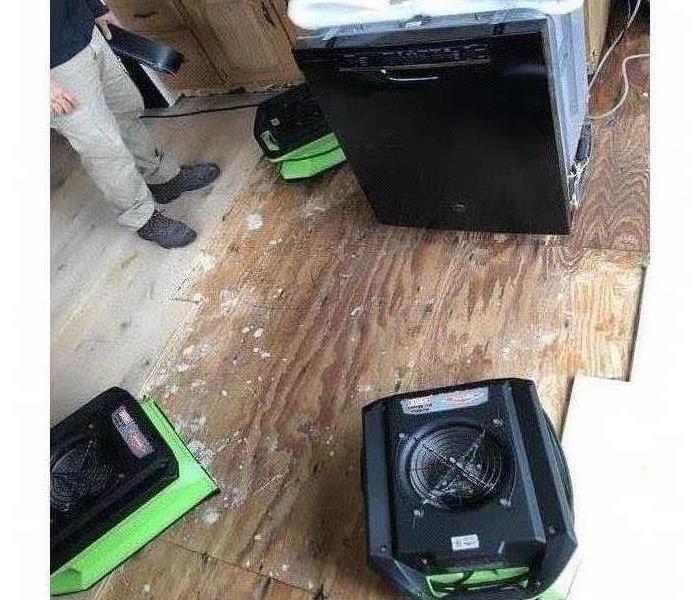 Dishwasher causing water damage in your kitchen? Call SERVPRO
Dishwasher causing water damage in your kitchen? Call SERVPRO
When we get a call from people who have been unfortunately faced with dishwasher-related water damage, we are quick to get on site to assess the situation. Hopefully, the owner of the property, or someone present at the loss, called us as soon as they noticed the damage; it is imperative that you call us quickly to avoid any further issues.
When we get on site, we work rapidly to extract water and set up drying equipment. Our response is swift and efficient, and our skilled technicians ensure they try to keep any unnecessary damage from occurring in any other areas.
We are committed to providing the best service we can to each and every person who asks for our help.
If your property is ever damaged by a faulty dishwasher, or any type of water damage, give your local SERVPRO a call today!
 In the event of any winter damage to your home this winter, do not hesitate to give us a call, we are here to help.
In the event of any winter damage to your home this winter, do not hesitate to give us a call, we are here to help.






 24/7 Emergency Service
24/7 Emergency Service




